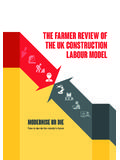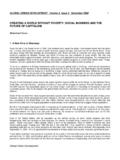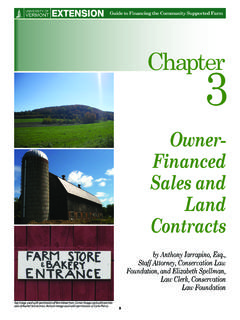Transcription of Question & Answers Health & Harmony: the future for food ...
1 Question & Answers Health & Harmony: the future for food, farming and the environment in a Green Brexit. Page 1 of 3 What is Health & Harmony: the future for food, farming and the environment in a Green Brexit? The Government has published a consultation paper on how to put its proposals for reforming agricultural policy into practice called. Health and Harmony: the future for food farming and the environment in a Green Brexit Here is a link to it: It states that there are two main objectives for a future policy: Encourage industry to invest, raise standards and improve self-reliance. Reward farmers and land managers for delivering environmental goods that deliver benefits to everyone. When will I start to see changes? The Government has already announced that nothing will change until 2020 meaning that Basic Payments will be made in 2019 as they are currently. Beyond that there is no clear timetable regarding issues such as whether the UK remains part of the Common Agricultural Policy as part of any transitional period with the European Union.
2 Regarding Countryside Stewardship, the Government has said they intend to continue to simplify scheme participation and the application process. They have also said they will continue to run a simplified Countryside Stewardship scheme until a new environmental land management scheme is introduced. How does the Government intend to move farming away from the CAP and to the new system? Firstly, it will phase out Basic Payment and has proposed options for doing this. Option 1: Tiered reductions, with different levels of reduction for different levels of payment (similar to income tax). Option 2: A basic cap on payments to those receiving more than a certain amount. Option 3: A variation of options 1 and 2 including potentially a different level of cap and/or reductions to be proposed by consultees. How this is done could clearly have significant implications for the sector. It is vital to ensure the no business that could be profitable in the long term is put at risk by the way transition is dealt with.
3 Page 2 of 3 / Question & Answers Health & Harmony: the future of food, farming and the environment in a Green Brexit Secondly, most likely from 2020, it will start to phase in the new model based on public money for public goods. Will direct payments to all farmers be cut? The Government s intention is to end the Basic Payment Scheme all together to all farmers. The exact wording from the document is below. We therefore propose to further reduce and phase out Direct Payments in England completely by the end of the agricultural transition period, which will last a number of years beyond the implementation period. What does the Government think will happen to farmers if there are no direct payments? The Government has stated there is "clear evidence showing that the scope for productivity improvements would enable farmers on average to remain profitable following the withdrawal of direct payments".
4 It goes on to note this is more challenging for livestock graziers. What other changes are being proposed alongside changes to the Basic Payment Scheme? Consideration is being given to which parts of cross compliance should remain, if any. The consultation also examines whether farmers currently in receipt of Basic Payments should be eligible to receive payments if they decide to stop farming with the amount of money the person receives being based on a historical reference period, so the farmer has a sum of money to investigate other opportunities. How does the Government propose to improve productivity? There are no specific proposals for improving productivity within the consultation. Instead it asks how productivity should be improved. The possibilities include: improving the take up of knowledge and advice, looking at the barriers to capital investment and improving the use of agritech. What does the new system based on public goods mean?
5 The Government intends to support a wide range of environmental benefits such as clean water and air, improved soil Health and wildlife, climate change mitigation but importantly, as the CLA has been demanding, support will also extend to animal Health and welfare, improving rural resilience and public access. The Government has said it recognises that farmers will need "fair rewards and strong incentives". It does not, however, say whether it is willing to challenge the concept of income forgone as a basis for payment. The consultation also asks about the role of payments for outcomes, suggesting they are not wedded to a purely prescription-based approach. Payment for outcomes: This is where farmers and landowners are paid for results rather than for undertaking prescribed activities, which are designed to deliver certain outcomes. The Government has said it wants to support animal welfare, how will it do this?
6 Page 3 of 3 / Question & Answers Health & Harmony: the future of food, farming and the environment in a Green Brexit There are no specific proposals. The consultation asks what role government has in improving welfare and whether it should be setting higher standards. It then asks what tools will bring the best results such as regulation, incentives, or advice. What about rural communities, will they be supported? The consultation asks how to support rural communities deliver environmental social and cultural benefits. It asks about the challenges they face; poor broadband and telephone coverage, finance, housing, business premises, labour etc and asks what government should do. There is no mention of any specific payments for farmers in remote areas. How will regulation change? The Government want a regulatory baseline that reflects polluter pays by setting out minimum standards.
7 Cross compliance will also be replaced by a new mechanism and there are questions on how regulation can be better targeted. A review has already been announced into the inspection regime in agriculture with the aim of reducing the inspection burden on farmers. Will there be any measures to help farmers manage risk? The Government does not believe it has any role in helping farmers manage risk. Instead it asks which factors most affect farmers business decisions to buy their own insurance. The consultation also asks what skills are required to better manage risks themselves. Does the consultation include measures to make the supply chain operate more fairly? No. The Government has already ruled out changing the Grocery Code Adjudicator s remit and there is no reference to any other government intervention. The document makes clear that the Government believe co-operative working is the way to achieve fairness in the supply chain The consultation does ask about promoting producer organisations, the desirability of statutory codes of practice and barriers to collaboration.
8





